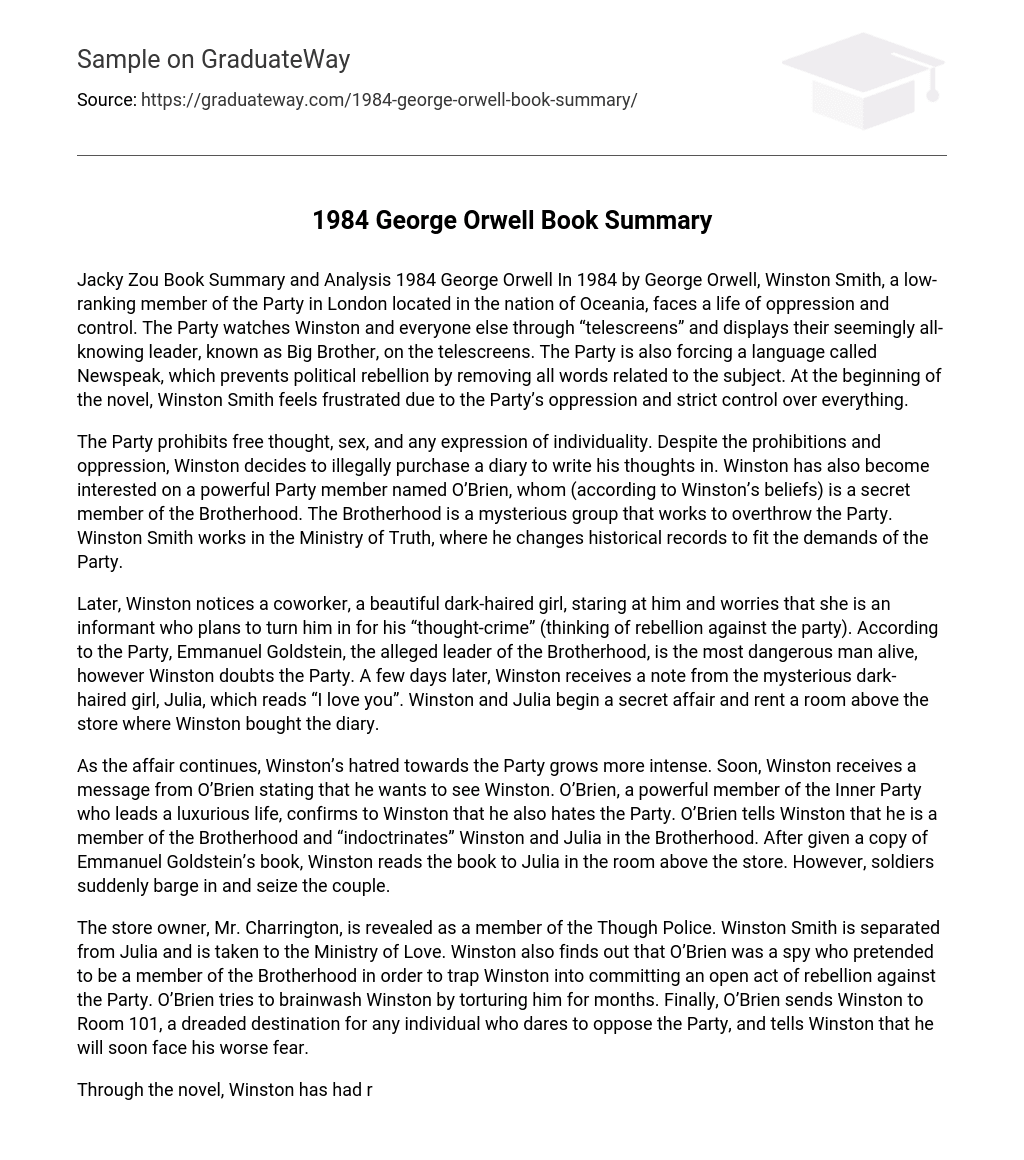Jacky Zou Book Summary and Analysis: 1984 by George Orwell.
In the novel, Winston Smith is a low-ranking member of the Party in London, located in the nation of Oceania. He faces a life of oppression and control as the Party watches him and everyone else through “telescreens”. The screens display their seemingly all-knowing leader, known as Big Brother. The Party is also forcing a language called Newspeak which prevents political rebellion by removing all words related to the subject.
At the beginning of the novel, Winston Smith feels frustrated due to the Party’s oppression and strict control over everything.
The Party prohibits free thought, sex, and any expression of individuality. Despite these prohibitions and the oppression they bring, Winston decides to illegally purchase a diary to write his thoughts in. He has also become interested in a powerful Party member named O’Brien, whom he believes is a secret member of the Brotherhood – a mysterious group working to overthrow the Party. Winston Smith works in the Ministry of Truth where he alters historical records to fit the demands of the Party.
Later, Winston notices a coworker, a beautiful dark-haired girl, staring at him. He worries that she is an informant who plans to turn him in for his thought-crime” – thinking of rebellion against the Party. According to the Party, Emmanuel Goldstein – the alleged leader of the Brotherhood – is the most dangerous man alive. However, Winston doubts this claim.
A few days later, Winston receives a note from the mysterious dark-haired girl named Julia. The note reads “I love you.” Winston and Julia begin a secret affair and rent a room above the store where he bought his diary.
As the affair continues, Winston’s hatred towards the Party grows more intense. Soon, he receives a message from O’Brien stating that he wants to see him. O’Brien, a powerful member of the Inner Party who leads a luxurious life, confirms to Winston that he also hates the Party. He tells Winston that he is a member of the Brotherhood and indoctrinates” both him and Julia in it. After giving them a copy of Emmanuel Goldstein’s book, they read it together in the room above the store. However, soldiers suddenly barge in and seize the couple.
The store owner, Mr. Charrington, is revealed as a member of the Thought Police. Winston Smith is separated from Julia and taken to the Ministry of Love. He also discovers that O’Brien was a spy who pretended to be a member of the Brotherhood in order to trap Winston into committing an act of rebellion against the Party. O’Brien attempts to brainwash Winston by torturing him for months until he sends him to Room 101, a dreaded destination for any individual who dares oppose the Party. There, O’Brien tells Winston that he will soon face his worst fear.
Throughout the novel, Winston has recurring nightmares about rats. In a cruel act of torture, O’Brien straps a cage full of rats onto Winston’s head with the intention of letting them eat his face. Overcome by fear, Winston begs O’Brien to inflict the torture on Julia instead. This outcome pleases O’Brien since his ultimate goal was for Winston to give up Julia. With his spirit shattered, Winston is eventually released and when he reunites with Julia, he no longer feels anything for her. This act serves as evidence that Winston Smith has fully embraced the Party’s ideology and has learned to love and obey Big Brother.
Themes of 1984: Oppression and Manipulation
In George Orwell’s 1984, the Party exerts control over individuals by bombarding them with psychological stimuli that are specifically designed to prevent independent thought. For instance, every citizen is subjected to constant propaganda from the giant telescreens in their rooms. The purpose of this propaganda is to make the failures of the Party appear as if they are triumphant successes. Additionally, telescreens monitor citizens’ behavior wherever they go, serving as a reminder that Big Brother” is always watching.
One act of oppression and manipulation carried out by the Party is the induction of children into the “Junior Spies”. This group brainwashes and encourages children to spy on their own parents and report any disloyalty to the Party. By manipulating things like freedom of thought and speech, the Party channels citizens’ frustration against its political enemies. Another theme in 1984 is “Physical Control”, which is similar to the mental manipulation carried out by the Party.
The Party controls the bodies of its subjects by forcing them to participate in morning exercises called Physical Jerks. After these exercises, members work long hours at government agencies and are kept in a state of exhaustion. Anyone who defies the Party is punished and reeducated through torture. Winston Smith believes that physical pain is more powerful than anything, and that not even emotional loyalty or moral conviction can overcome it.
Another theme in 1984 is the manipulation of history and information.
The Party controls every source of information through the Ministry of Truth. This gives them the ability to rewrite the content of all newspapers and histories for their own purposes. Additionally, individuals are not allowed to keep records of their own pasts, such as photographs. As a result, memories become unreliable and citizens begin to rely on the information provided by the Party. Essentially, by controlling the present, the Party is able to control the past. By manipulating information from the past, they can justify their actions in the present.





